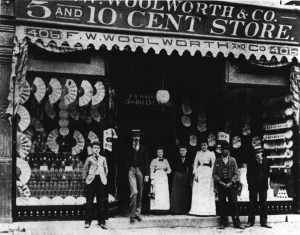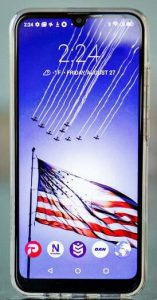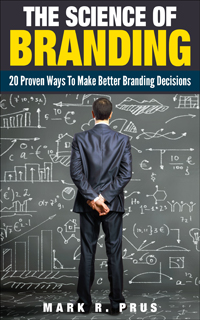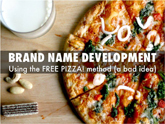Names Matter
On 7/28/2021 I published a post about renaming Moderna/J&J vaccine as the “Trump Vaccine” to get more people interested in being vaccinated: https://nameflash.com/2021/07/take-the-trump-vaccine/
Researchers proved my point: https://www.nytimes.com/2022/04/06/opinion/covid-vaccine-republicans.html
Pretending that Trump was supportive of vaccines dramatically increased vaccinations. #names are powerful
Target Market Relevance
A few days ago, a fellow name developer asked what I thought of the name Napkins Bar and Grill.
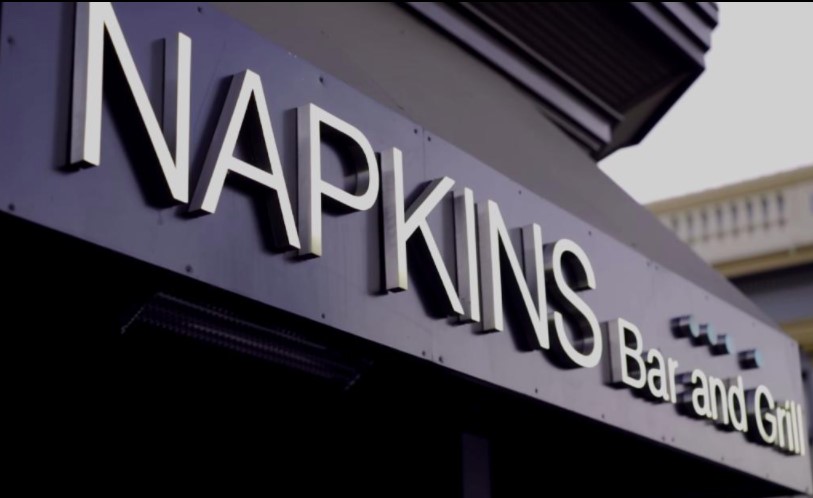
My initial thought was that Napkins implies something that you’d need when eating BBQ, and in fact, the #1 Google search result for “Napkins Restaurant” is such a place located in Dirtbag Ales Brewery & Taproom in North Carolina. So, if the name was for such a restaurant then it might be OK.
But in this case the Napkins Bar and Grill is located in the heart of downtown Napa, hardly southern BBQ territory. It is also quite an upscale facility. So my initial impression of the name Napkins for this restaurant was negative.
Then I learned that people who are born and raised in Napa Valley use the term Napkins to refer to themselves.
Which makes the Napkins Bar and Grill name especially relevant for their target audience.
Your name needs to appeal to your target market, and Napkins Bar and Grill does that in spades by demonstrating a very deep understanding of their community.
Well played Napkins Bar and Grill!
Name Generators
The internet is full of them. For example, a Google Search for “name generator” returns over 14 million results.
As a professional name developer, you might imagine that I would oppose the use of a name generator. Au contraire mon ami.
There is nothing wrong with using a name generator. In fact, some of them are very good because they use AI to identify proper keywords and relevant terms for your industry. Personally, I believe that a professional name developer can do a better job for you and using a professional is always easier if you can afford it. But if you have to “do-it-yourself” then a name generator might work for you.
The problem with using a name generator is this. The output from a name generator can be staggering. It is like trying to get a drink of water from a fire hose. You literally will drown in names, many of which are so bad you will wonder why you wasted your time.
This is why you need to make sure you have done your strategic homework BEFORE you start generating names. Follow a process such as this one I recommend below, and you will have a strategic platform in place that will make the process easier. A strategic platform enables you to refine your use of a name generator, so the name generator provides names that are closer to your objective. And the platform enables you to quickly evaluate the names that are generated.
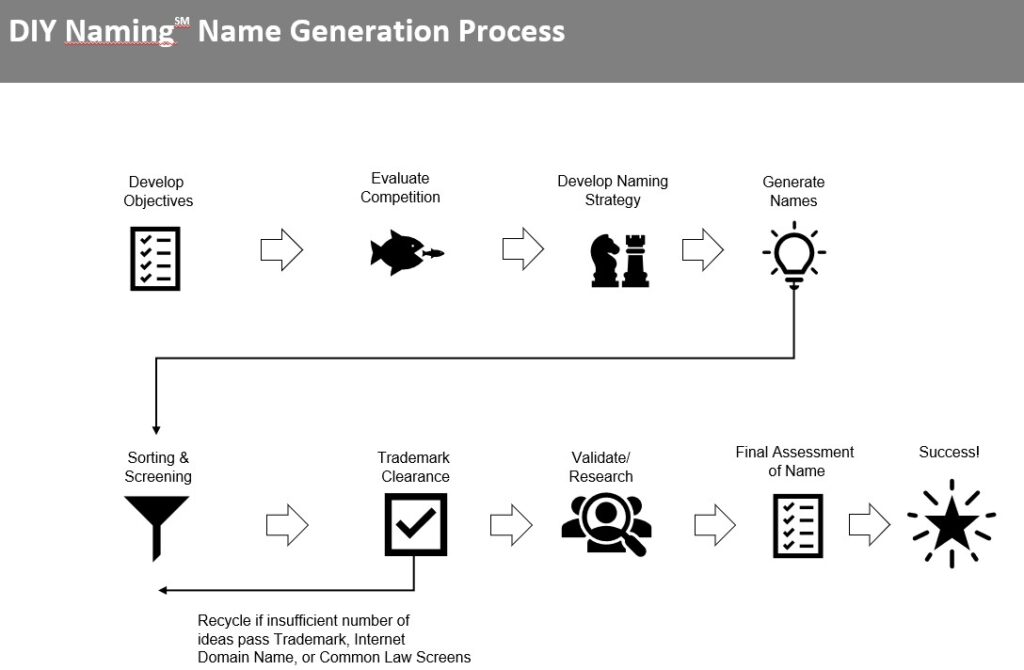
I’ve always said that the hard part of developing a name is not generating names. No, the hard part is deciding which names will resonate with your target audience. If you have a strong strategic foundation, and use a consistent approach to evaluating names (such as this one which is free for a limited time: https://dynamingnameevaluation.carrd.co/), then you will have much greater success in finding a terrific name!
What Do People Name?
I recently found a fantastic tool that provides data on Google searches: www.answerthepublic.com. It is a fantastic search listening tool.
Just for fun, I wanted to see what people search for under the category of “name my…” Here are the top-rated entries for each letter of the alphabet:
A: Name my airpods
B: Name my business
C: Name my car
D: Name my dog
E: Name my Esty shop
F: Name my frame
G: Name my game
H: Name my house
I: Name my iPhone
J: Name my Jeep
K: Name my kitten
L: Name my location
M: Name my molecule
N: Name my necklace
O: Name my organic compound
P: Name my plant
Q: Name my qartulad
R: Name my rings
S: Name my song
T: Name my tune
U: Name a US state
V: Name my van
W: Name my wheel
X: Name my Xbox one
Y: Name my YouTube channel
Z: My name zodiac sign
Some of these are quite expected (e.g., name my dog; name my business; name my kitten). What’s with the fixation on jewelry (name my necklace; name my rings)? And I was stunned to see that more searches are done on “name my car” than “name my cat.”
Collective Nouns
Anyone who has spent some time studying the English language would know about collective nouns, which are nouns that denote a group of things. As a professional name developer, I often use collective nouns as building blocks for names of companies, products, or services. Here are some examples of collective nouns:
https://englishstudyhere.com/collective-nouns/collective-nouns-list/
I recently signed up for Peacock, the streaming service from NBCUniversal. The next day I received an email from them with the subject line: “Welcome To The Flock!” Well, the inner geek in me Googled “what do you call a group of peacocks” and found that the proper collective noun would be a “muster of peacocks” not a “flock of peacocks.”
I’m a big fan of cute marketing tactics that engage new customers, and the outreach on the day after I signed up for Peacock was good. But I do wish that NBCUniversal would have utilized proper proofreaders to ensure their content was grammatically correct!
And yes, I know “Welcome To The Muster” as a subject line would suck. So pick something else that would be grammatically correct!
What Do You Call Fake Eggs?
A few years ago, the dairy industry took the plant-based milk industry (almond milk, etc.) to court over the use of the term “milk.” Here is what the dairy industry spokesperson said:
“You haven’t ‘got milk’ if it comes from a seed, nut, or bean,” said Jim Mulhern, the president of the National Milk Producers Federation. “In the many years since we first raised concerns about the misbranding of these products, we’ve seen an explosion of imitators attaching the word ‘milk’ to everything from hemp to peas to algae.”
Lawsuits have not been very effective at resolving the issue. Plant-based groups insist they should be able to use the term “milk” when selling their products, so long as they aren’t trying to pass off their products as being conventional milk.
Then came the controversy over the use of the word “rice” in the name “Cauliflower Rice.” The marketers behind cauliflower rice felt so strongly that they’ve argued it’s a freedom of speech issue, protected by the US constitution.
But topping the list is the chutzpah exhibited by Just Egg. You see, a product called “Just Egg” should be (wait for it) just eggs, right? Nope. Just Egg is a plant-based egg substitute.
https://www.ju.st/plant-based-eggs
Now don’t get me wrong, I’m all for a plant-based diet if that is your preference. I just don’t like it when companies use misleading branding to sell their product. And in this case, I believe the name “Just Egg” crosses the line by suggesting their product is made from actual eggs.
Genius In Naming
Sometimes you’ve got to take your hat off to a company that does a great job in naming. Today I want to honor Evil Genius Beer Company.
First of all, let me go on record and tell you how hard this is for me. I live in Pittsburgh, and Evil Genius Beer Company is in Philadelphia. People from Pittsburgh aren’t supposed to like anything from Philadelphia (huge sports rivals).
I don’t know how their beer tastes, but I do know these guys are Naming Geniuses. If you visit their “Beer Name Hall of Fame” you will see why I feel this way. I also love the format of presenting the names in the style of the opening credits of Star Wars!
http://evilgeniusbeer.com/hall-of-fame/
Here are a few of my personal favorite names from their beer selections:
• THERE’S NO CRYING IN BASEBALL (HAZY MANGO IPA)
• I’LL HAVE WHAT SHE’S HAVING (CHOCOLATE HAZELNUT IMPERIAL STOUT)
• #ICANTEVEN (WATERMELON BLONDE ALE)
• NEW PHONE WHO DIS? (CARAMEL MACCHIATO PORTER)
I could go on and on…check out the names in their Beer Name Hall of Fame and if you get to Philly have some of their beer and tell me if the beers live up to the names!
Good And Bad COVID Naming
We’ve seen some good branding and some bad branding with COVID medicines. Here is a rundown of some of the branding in the COVID space:
Pfizer/BioNTech Vaccine = COMIRNATY®
Here is what Pfizer says about the brand name COMIRNATY: “…represents a combination of the terms COVID-19, mRNA, community, and immunity, to highlight the first authorization of a messenger RNA (mRNA) vaccine, as well as the joint global efforts that made this achievement possible with unprecedented rigor and efficiency – and with safety at the forefront – during this global pandemic.”
Whew…that’s a lot of explanation. In my experience, when you have to spend that much time explaining your name, you probably do not have a very good name.
Moderna Vaccine = SPIKEVAX®
SPIKEVAX is a more straightforward name that directly references the unusual spike protein of SARS-CoV-2 and “vax” for vaccine. This name is like a fastball down the middle of home plate. Nothing fancy, but pretty effective.
AstraZeneca Vaccine = VAXZEVRIA®
AstraZeneca says VAXZEVRIA is the COVID-19 vaccine for everyone. This naming strategy was revealed by the developers of the name. “When AstraZeneca approached Brand Institute about partnering on the name for their COVID-19 vaccine, their goals were clear,” said Brand Institute’s Chairman and CEO, James L. Dettore. “AstraZeneca is committed to helping end the deadliest pandemic in a generation by supplying the COVID-19 vaccine at no profit to hundreds of millions of people around the world. Every village and every town was a phrase that was introduced early on, and I still remember it. This creative direction became one of the dominant themes explored in the development of potential brand name candidates.”
Interesting sidebar: Did you know that each of the above vaccine names were developed by the same company? Brand Institute is the Goliath of the drug naming industry.
However, Merck may have topped all of the vaccine names with their new drug, molnupiravir.
Merck Oral Antiviral Medication = Molnupiravir (drug generic name)
Merck announced on October 1 that Merck and Ridgeback’s Investigational Oral Antiviral molnupiravir reduced the risk of hospitalization or death by approximately 50% compared to placebo for patients with mild or moderate COVID-19. This drug could be a game changer as it is a simple (5-day course of therapy) oral medication that can help treat COVID-19.
The generic drug name, molnupiravir, is also groundbreaking.
Generic drug names are not brand names. The Merck Manual explains the difference:
When a drug is approved by the Food and Drug Administration (FDA—the U.S. government agency responsible for ensuring that drugs marketed in the United States are safe and effective), it is given a:
• Generic (official) name
• Brand (proprietary or trademark or trade) name
For example, phenytoin is the generic name and Dilantin® is a brand name for the same drug, which is a commonly used antiseizure drug. Diazepam is the generic name of a sedative that is marketed by some companies under its generic name and by other companies under brand names such as Valium® or Vazepam®.
Dean Li, Merck’s head of research and development, revealed the origin of the molnupiravir name to the medical publication Stat News. “Our prediction from our in vitro studies and now with this data is that molnupiravir is named after the right — you know, it’s named after Thor’s hammer [Mjollnir], this is a hammer against SARS-CoV-2 regardless of the variant.”
Well played Merck. I think Merck just won the COVID naming challenge!
Don’t Outgrow Your Name
Frank Winfield Woolworth, who founded the F. W. Woolworth Company in 1879, was the innovator in variety stores known as “Five-and-Ten-Cent Stores” which featured a wide selection of low-priced merchandise at a low fixed price. For many years the company did a strictly “five-and-ten cent” business, but in the spring of 1932, it added a 20-cent line of merchandise. By 1935, the company’s directors decided to discontinue selling-price limits altogether.
A similar situation arose this past week when Dollar Tree Inc., who is known for selling goods for $1, announced it will establish new higher price levels such as $1.25 and $1.50, citing broken supply chains and higher labor costs as the reasons for the increase.
Dollar General Corp. broke the $1 price point several years ago, and Five Below Inc., which features goods at prices below $5, recently announced it will sell goods priced above $5.
Have these brands outgrown their names?
I believe they have outgrown their names, but I also do not expect them to change their names. Establishing a new trademark is expensive and time consuming, and companies would not want to risk losing their existing equity in their brands.
However, their situation should make you think about your branding situation, especially if you are just starting your company. Don’t pick a name that you will outgrow in a few years.
Burlington Coat Factory was started as a wholesale outerwear business in Burlington, New Jersey. I’d say their name was limiting in two ways: geographically (because they would expand beyond Burlington, New Jersey) and from a product line standpoint as they quickly evolved to other clothing items. How much business was lost because people thought they sold only coats?
The Dunkin’ Donuts brand recently dropped Donuts from their name and became just Dunkin’ to reflect the fact that most of their sales come from drinks not donuts.
Don’t outgrow your name. Plan for future expansion by at least considering what your business will look like in 10 years. Then make sure your name can accommodate that future!
Freedom Phone – A Master Class in Branding and Positioning
A 22-year-old Bitcoin Millionaire has launched a “smartphone for Conservatives” called The Freedom Phone. Here is the New York Times article that details his effort.
The name is great. The positioning is great (liberate Americans from their “Big Tech overlords”). The marketing has been great (his launch video has over 1.8 million views). And he’s already sold over $6 million worth of these phones.
The problem? The phones suck. CNET, the product-review site, said the $500 device appeared to be “nearly on par with a $200 budget Android phone.” Ouch.
The NYT article explains some of the issues that arise when trying to launch a new phone without the assistance of the major tech companies. But I have no sympathy for anyone who is dumb enough to buy this. Or any of several products marketed via the Conservative media these days (Ivermectin anyone?).
But you’ve got to admire the straightforward naming and positioning. Credit where credit is due.


